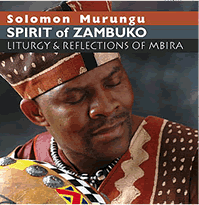Spirit of Zambuko: Liturgy & Reflections of Mbira
About this Recording
 This recording is about Shona mbira liturgy and an interpretation of this music through personal experience. Accepting the context sensitivity of mbira, relying on an early childhood of Shona worship, in this recording, the author uses traditional mbira music to augment and expand beyond current ethnomusicology literature to expose the power and timelessness of mbira music.
This recording is about Shona mbira liturgy and an interpretation of this music through personal experience. Accepting the context sensitivity of mbira, relying on an early childhood of Shona worship, in this recording, the author uses traditional mbira music to augment and expand beyond current ethnomusicology literature to expose the power and timelessness of mbira music.
The music and its cultural framework renders not only an infinite set of playing styles, but its voice provides words that can have personal meaning and interpretation based on one’s context and state of mind. It relies on simplicity to augment and avail to listeners the fundamental rhythms of the mbira. The polyphony and density of music from a minimal three-piece mbira orchestra can be exceptionally challenging to follow. With interwoven melodic patterns, often accompanied with built-in overtones, the sound can be powerful, infectious and yet elusive to listeners. This recording, in the spirit of education and cultural sharing, purposely subtracts the density and complexity of an mbira orchestra and presents a solo performance allowing a lot of space to hear and reflect on the music. Additionally, it captures the right and left hand mbira rhythms as independent stereophonic channels, allowing the listener a unique interactive listening experience. Absent in this recoding are the kutsinhira, hosho and voice, fundamental components of a minimal mbira orchestra performance. This gives the listener an unusual opportunity to hear the founding layers of the music with a clear backdrop. Mbira students will find the simplicity refreshing and a means to a better understanding of basic patterns of mbira music. The absence of percussive rattles characteristic of an mbira sound space was a deliberate attempt to further isolate basic components of the music.
Shona culture, as with many old cultures, is laden with meaning and symbolism. The music can be a springboard for personal reflection and spiritual realization, speaking through a silent voice whose poetry and meaning are individualized to the listener’s feelings and experiences in life. As music whose voices (notes) articulate syllables in the vocabulary of its native Shona language, and drawing from age-old traditions of symbolism, ceremony and meaning, we present this music in Shona liturgical format as experienced by this author.
The music starts with the “Call of the Ancestors” progressing onto “Spiritual Seduction,” followed by “Supplication/Petition,” then ending with “Thanksgiving and Celebration,” thus reflecting the process for personal worship and spiritual relationship-building
- Solomon Murungu